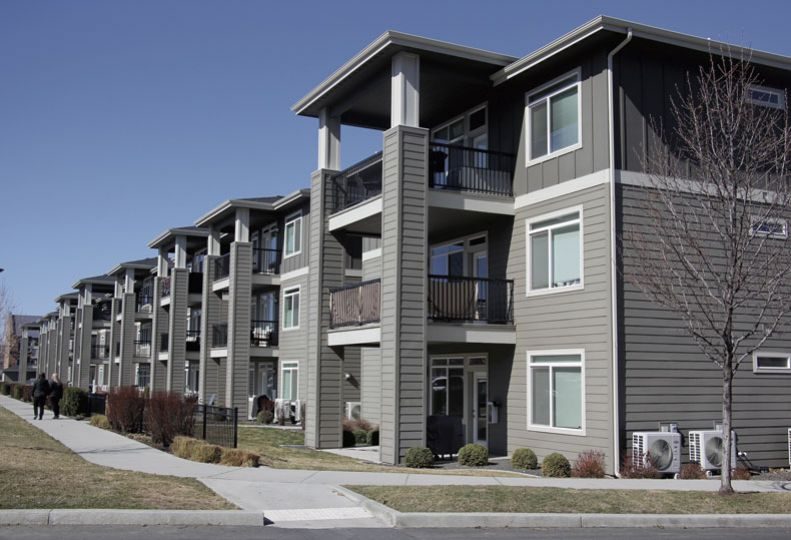
Home » New rental laws to change some legal practices
New rental laws to change some legal practices
For some attorneys here, landlord-tenant disputes lead to more billable hours

March 30, 2023
New ordinances passed by the Spokane City Council are intended to pave the way for safer housing for renters, but some lawyers here disagree about what kind of impacts the new rules will have on their legal practices.
Attorneys who represent landlords or tenants alike agree, however, the two ordinances benefit and expand tenants’ rights.
One ordinance requires business licenses for many landlords, charges per-unit fees, creates a rental registry, and funds code enforcement and periodic inspections of rental properties.
The other adopts rules for portable background and credit checks and creates a residential rental mitigation program and a legal services and relocation program. It also requires walkthroughs and inspections of units, landlord disclosure, protects tenants against retaliation, and allows tenants to sue landlords for noncompliance.
Spokane-based attorney Steven Schneider, who typically represents landlords, says while tenants’ rights are expanding, the ordinances have added another level of complexity to his job. Those complexities could make it take longer to settle disputes, consequently adding up to higher legal fees for clients.
Schneider says he charged a flat rate for work on eviction cases due to the simplicity of the process prior to adoption of the new ordinances.
“Now, we’ll have to charge an hourly rate,” he says. “They’ll become two and three times more expensive for landlords and take much more time.”
Schneider says the extra time to resolve rental disputes has already grown 200%, to about 90 days.
“It really increases the burden on landlords,” he says, adding that legal costs already have climbed 400% to 500% higher due to fees and delays since the pandemic.
Tenant-landlord issues now comprise most of Schneider’s work, increasing to 70% of his business from 30% prior to the pandemic.
Victoria Freebourn, staff attorney for the Eviction Protection Unit at Spokane-based Northwest Justice Project, says not much will change for her as a tenant lawyer.
Her business model differs from Schneider’s in that she is paid by the Northwest Justice Project, rather than her clients, who must qualify with a financial need to be represented.
Freebourn says she views the rental ordinances as a positive way to create more habitable housing for the city of Spokane and could result in less work for her as an attorney.
“It potentially wouldn’t even get to me if landlords were to follow these new rules and have inspections with code enforcement,” she says. “And it could decrease evictions.”
Freebourn says she doesn’t expect many changes to the way she handles rental issues for clients, although she does see positive changes for renters, including increased credibility in the courts as a result of the regulations.
For example, a code enforcement officer can confirm a tenant’s claim that a rental unit is without heat.
She says, “Hopefully, it won’t even come to that, because they’ll have inspected the property prior to it being rented.”
Schneider says that he’s noticed a more cooperative environment in cases where he’s working with tenant’s lawyers to resolve rental disputes on the eviction docket.
“It’s more collaborative now than adversarial, and it’s really been much better for the system, because we get to talking even before the hearing and could agree to settle the case before the hearing,” he says.
Freeborn says about 25% of her tenant clients have habitation complaints in which renters typically seek help with rental units lacking heat, having utility issues, or exhibiting other unsafe conditions.
“Ultimately, it will mean safer rentals,” says Freebourn. “It won’t affect landlords who are doing a good job out there. I think this is aimed at slumlords and people who rent health hazards with mold problems.”
Schneider says that, outside of impacting his practice, he’s worried the changes to rental laws here could result in fewer rental units on the market.
During the pandemic-related eviction moratorium, many of his clients who are landlords for subsidized housing decided to sell their rental properties instead of working with tenants on rental repayment plans.
“A lot of my clients are small landlords and people who are in retirement,” Schneider says. “They can’t afford this. They’re on a fixed income.”
Steve Corker, newly installed president of the Spokane Valley-based Landlord Association of the Inland Northwest, concurs and says he expects more landlords will sell their rental properties, reducing an already tight rental inventory for subsidized housing in the market.
Corker says about 42,000 rental units are within the city. Of those, about 7,000 are subsidized units.
The private sector provides most of the housing, he says.
“If you take away or ignore that reality, that transition to having the public sector assume that financial responsibility for low-income housing, I think, is almost an unbearable responsibility for the next five to 10 years,” says Corker.
As federal rental assistance for tenants starts to dwindle, Schneider says he anticipates landlords will evict tenants who don’t pay more frequently.
Schneider says his practice offers legal representation for real estate matters including quiet title, boundary lines, probate and probate disputes, in addition to landlord-tenant disputes.
The ordinance that supports mediation authorizes the city of Spokane to use money from a new Legal Services and Relocation program to provide attorney services for landlord and tenant legal issues and mediation costs.
Schneider says the mediation provisions in the ordinance are good for his business, because mediation creates an avenue for finding agreements that can be enforced by the courts.
“Instead of tenants being under this great burden of back rent and trying to make rent plus a payment plan, we can agree to be out by this date, and then we won’t worry about the back rent,” he says. “Really, what we want is possession of the property.”
If an agreement resulting from mediation is breached by the tenant, the landlord can pursue an eviction procedure in court, he says.
He says mediation also can help keep people housed.
“It’s good for me if I can keep somebody housed and my clients are getting money,” Schneider adds. “And if that keeps a young mother housed, that’s a win.”
Corker, who also is transitioning to semiretirement while working as executive vice president of Arlington, Virginia-based environmental services company Futurepast Inc., is also a longtime landlord, with about 19 low-income rental units in the city.
He says he intends to rely on income from rentals in retirement and will remain committed to providing subsidized housing for renters here.
Corker says he expects landlords will pass fee increases along to tenants, although that could create unaffordable rentals going forward.
Freebourn says more time is needed to understand if any other impacts to her job will occur as a result of the ordinances.
“I appreciate the Council for understanding the importance of these tenant issues and balancing with landlord concerns, but I don’t know how exactly this is all going to play out,” she says.
Latest News Special Report Real Estate & Construction
Related Articles
Related Products


![Brad head shot[1] web](https://www.spokanejournal.com/ext/resources/2025/03/10/thumb/Brad-Head-Shot[1]_web.jpg?1741642753)

